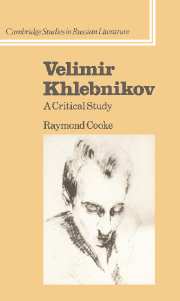2 - The tower of the crowds
Published online by Cambridge University Press: 12 September 2009
Summary
A poet whose chief reputation has resided in incomprehensibility and for whom the coded text has become something of a hallmark might not be expected to manifest a life-long preoccupation with the crowd. However, the difficult nature of Khlebnikov's text should not conceal from view a poet who demonstrated a constant awareness of the significance of the crowd, in particular with regard to the poet and his tasks.
Such a preoccupation is, of course, well within the Russian literary tradition. In the nineteenth century, there had been considerable debate about the relations between the poet and the crowd and about the relative merits of ‘pure’ and ‘civic’ poetry. Nikolay Nekrasov, a keen advocate of the engaged ‘civic’ verse, summed up the conflict in the memorable lines – ‘a poet you may not be, but to be a citizen you have an obligation’. It is doubtful whether Khlebnikov would have posed the problem in such terms, but if Nekrasov ‘devoted his lyre’ to the Russian people (narod), and listened to their songs, then there is something of this in Khlebnikov's work too.
Khlebnikov was by no means a large-scale imitator of folk art, but it certainly had some influence on his work. It was, for example, in folklore that he found an important thematic source for his creativity. The language of folklore has also been seen as relevant for his neologistic activity.
- Type
- Chapter
- Information
- Velimir KhlebnikovA Critical Study, pp. 31 - 66Publisher: Cambridge University PressPrint publication year: 1987

